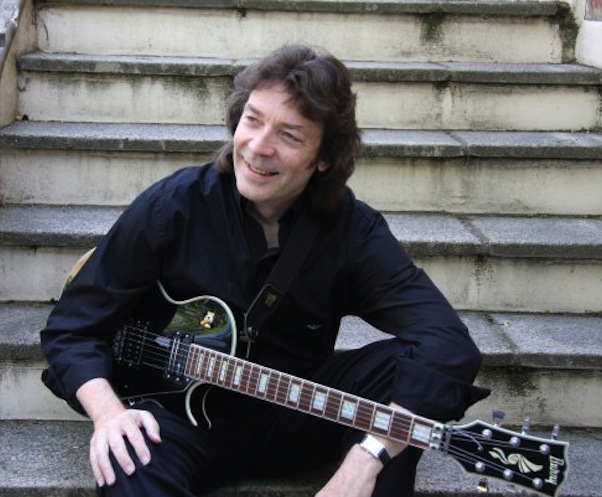Rock Concert Review: Guitarist Steve Hackett — The Real Thing
Of all the songs ever written about a woman violated by her brother’s ghost after she decapitates him playing croquet, “The Musical Box” remains the best.

Steve Hackett — he is the only classic-era member of Genesis still playing this material.
By Brett Milano
40 years ago this week, the band Genesis released its double concept megawork, The Lamb Lies Down on Broadway. As crafted by lead singer Peter Gabriel, the lyrics told one of the more surreal coming-of-age story ever imagined. Though generally lumped into the progressive rock bandwagon, the music was something else again: Often soaringly melodic, sometimes downright chaotic and always just a bit off-center. Nobody in the world would have guessed that this would someday become a hugely successful mainstream pop band.
Guitarist Steve Hackett wasn’t around for the pop success: He left Genesis in 1977, two years after Gabriel did. And in retrospect, Hackett’s departure affected Genesis more than Gabriel’s: With Phil Collins singing Genesis made two more albums, A Trick of the Tail and Wind & Wuthering, both rich in melody and imagery (The first post-Hackett album brought the first pop hit, “Follow You Follow Me”).
Hackett went on to a solo career that included just one regrettable sellout (the short-lived supergroup GTR), but generally stayed true to his ideals—which usually means making new music and not leaning on his past. So his current “Genesis Revisited” tour may look like a retread—but with a rumored Genesis reunion recently falling through, and with Collins and keyboardist Tony Banks apparently retired, Hackett is the only classic-era member still playing this material.
Hackett approached it with a healthy attitude at Lynn’s Lynn Auditorium this week, announcing at the start that “The museum doors are open, and we’ve taken it over.” The songs were played as they were in 71-74: With the band huddled together on a theater stage, minimal staging, none of the arena technology that came later. Since Genesis was never a guitar-centric band, Hackett rearranged the songs only to give himself a few more solos; though the familiar keyboard and flute parts (yes, Gabriel was once a pretty good flautist) were capably handled by bandmembers Roger King and Rob Townsend. Lead singer Ned Sylvan stood off to the side, looking remarkably modest for a Genesis singer. True, he wore a frilly pirate shirt and kicked his legs up a few times, but anyone who thinks that makes him too dandified doesn’t remember Gabriel in those days.
For those in love with early Genesis and put off by the pop success it was pretty much a dream set, covering the epics from the early albums, most of which were never played live after Hackett left the band (Only The Lamb was shortchanged with just two short pieces, “Lilywhite Lilith” and “Fly on a Windshield”). “The Knife”, about a bloody revolutionary and his deluded followers, was strong stuff for 1971; and the liquid landscapes on “Firth of Fifth” were gorgeous then and now. Hackett took to classical guitar for his trademark acoustic piece “Horizons,” and let the electric rip on the Latin-fusion piece “Los Endos.” And you may have forgotten the band’s strong sense of the macabre: Of all the songs ever written about a woman violated by her brother’s ghost after she decapitates him playing croquet, “The Musical Box” remains the best.
So why see this instead of one of the Genesis tribute bands—like the Musical Box, who headlined the Wilbur last year—who get every note and every piece of staging exactly right? Because Hackett remains the real thing, and his flair for sonic imagery has grown over the years. For his climactic end-of-the-world solo on “Supper’s Ready” he heightened the original drama, doing his best banshee wails, cosmic echoes, and violent string-bends. It improved on a beloved piece, and tribute bands can’t do that.
Brett Milano has been covering music in Boston for decades, and is the author of Vinyl Junkies: Adventures in Record Collecting (St. Martins, 2001) and The Sound of Our Town: A History of Boston Rock & Roll (Commonwealth Editions, 2007). He recently returned from New Orleans where he was editor of the music and culture magazine OffBeat.
